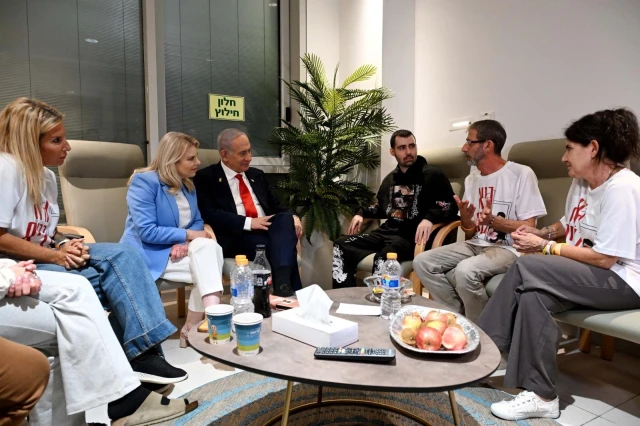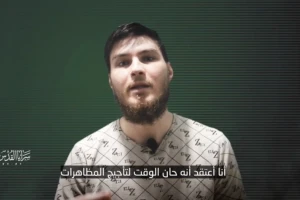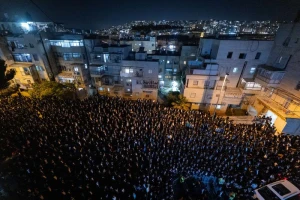Whipped, chained, held in underground cages: Former hostages reveal horrors of Hamas captivity
Medical staff is optimistic about the chances of recovery

Several days after their miraculous return from Hamas captivity in Gaza, the families of the 20 freed hostages have begun sharing the gruesome details of the horrors their loved ones experienced at the hands of the Hamas terrorists for over two years.
“Every one of them has endured untold adversity and horrors, and therefore the road for recovery is going to be a very long one,” said Prof. Itai Pessach, associate director-general of Sheba Medical Center, which has received and continues to treat the hostages over the past week.
Despite fear of the worst, all the returnees were able to stand and walk on their own two feet, and the doctors are optimistic about their chances of an almost full recovery.
“As a physician and as a human being, I can’t emphasize enough the impact of being surrounded by their loved ones on the general well-being and their ability to heal,” Pessach emphasized, noting that they will “probably need weeks, months, and maybe years to heal.
In addition to wounds from beatings and other torture, one of the main problems they suffer from are the effects of two years’ malnutrition.
“The body remembers those 700-plus days of captivity and starvation,” said Dr. Michal Steinman, director of nursing at the Rabin Medical Center in Petah Tikvah.
“It’s going to be a very long road, and there are going to be ups and downs, but I think each one of them developed really special techniques of survival and how to keep their mind and soul guarded,” she said.
Idit Ohel, mother of freed hostage Alon Ohel, said her son suffered from shrapnel in his eye for two years, severely impacting his vision. However, she said the medical staff is optimistic that part of the vision in the eye can be restored through surgery.
Tami Braslavski, the mother of Rom Braslavski, said her son told her he was whipped and beaten “with things that I will not even mention,” and that the terrorists tried to persuade him to convert to Islam for extra food and better conditions.
For long stretches of his captivity, Braslavski received only one half pita in the evenings while his hands and feet were cuffed.
“It’s important for him to maintain his Jewish identity because they asked him to convert to Islam,” she said. “They tried to tempt him with food and small gifts. He didn’t break down and didn’t do it.”
Avinatan Or, the boyfriend of former hostage Noa Argamani, had his hands and feet cuffed and was held alone in a tunnel for the entire duration of his captivity.
“Avinatan tried to escape from captivity, and then they beat him,” his father, Yaron, told Kan News. “He was handcuffed to the bars. It was a barred place 1.8 meters [six feet] high, and the length of it was the length of the mattress, plus a little. You can call it a cage.”
“They didn’t starve him, but the food was scarce. He is very thin,” he said.
Rabbi Avi Ohana, father of returned hostage Yosef-Haim Ohana, said his son was put in an underground pit for several days together with six other hostages shortly before their release.
“[They] put seven men in a pit. They could not sit, only lean against the wall while standing. He lacked oxygen. I thank God, who made him strong. What kept him going was his family.”
Earlier, their captors had forced Ohana and another hostage to listen to Muslim religious broadcasts on the radio. However, the two managed to adjust the dial and tune in to Israeli Army Radio, where they heard an interview with Ohana’s father.
“He said to himself, ‘My father is alive! He is waiting for me!’ and it gave him new life,” the father explained.
Yotam Cohen, brother of freed hostage and IDF soldier Nimrod Cohen, told Haaretz newspaper that the terrorists “tried to convince them to believe that Israel gave up on them, that the government didn’t want to bring them back, that the country wasn’t fighting for them.”
Nimrod was also held in a cage in a tunnel for one and a half years, while being interrogated, blindfolded, and beaten, he said. “They treated him worse because he was a soldier.”
Many of the returnees recounted that their faith was one of the main things enabling them to stay sane and not lose hope.
Julie Kupershtein said her son Bar surprised her upon his return when he asked for a tzitzit, the traditional Jewish garment with ritual fringes.
“I was in shock,” she told Army Radio, “He had faith, he was kind of traditional, but not like this. There were Muslims in captivity who prayed to the Creator as well, and they observed all the holidays and fasts, and he said that if they do that, then he also wants to be close to the Creator of the world.”
“They went through severe abuse and torture – really,” she said about her son Bar. “Horrible starvation. You wouldn’t treat animals that way. He tells me things, and I sit in front of him crying, realizing my child is strong and brave – there’s no one like him in the world. Then he tells me: ‘Mom, you should know, they beat me, but I didn’t feel it – my body was numb.’ He said it was all in the mind, like he trained himself mentally not to feel the pain – and he survived.”
“Every time one of the terrorists was killed, or if a relative of theirs had their house destroyed or something, they would come and beat them up badly and torture them. There were really hard times. I prefer not to go into detail. He told me, ‘Mom, I slept – I just kept sleeping. I didn’t let background noise disturb me. I simply chose to sleep.’ And he did – he slept for hours. That’s something that kept him sane. Also, the fact that they were together made it easier than being alone with all the brainwashing.”
She said of Bar, “Once, he told us they had to pass through several houses, and in the last one, something went wrong. The building was blown up – and he was supposed to be there. So he was literally saved by a miracle. He wasn’t supposed to be here, I’m telling you honestly. He took it upon himself to do an act of charity. He told himself, ‘I have 200 shekels in my wallet at home, and when I get out of captivity, I’ll take them and donate them – and that will save me,’” she said.
“A person who’s in darkness, in hell – I think the first thing is to connect to the Creator, to try to save yourself somehow,” adding, “He had a dialogue with God. He would say the Shema Yisrael prayer, he prayed, he recited a Psalm he knew.”

The All Israel News Staff is a team of journalists in Israel.
You might also like to read this:











